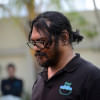The shady ‘recycle-man’

He is an apparent big shot in the black market of medical recyclables. Probably in his late thirties, the man keeps close supervision over his business and is careful to leave no footprints behind.
His name is Jonny Mia.
An almost mythical character, in the shady world of medical recyclables, searching for him was akin to chasing shadows.
The Daily Star correspondents heard of his name on plenty of occasions while investigating medical waste recyclables. Only upon meeting him, was his existence finally uncovered.
It was around midday on October 3. The correspondents were waiting outside one of his scrap shops in Old Dhaka’s Islambagh, when the sound of a motorcycle alerted them to his arrival.
At the time, not more than 10 minutes before that, the correspondents had walked into that shop to talk to two men resting there.
The workers in the shop were explaining how they cut large plastic junks before feeding those to a machine. The machine would turn the plastics into smaller pieces.
They said they got medical plastics like used syringes, saline bags and blood bags, and salvage parts for different industries.
Cut-out pieces of medical items were protruding out of sacks at the time.
Asked about their supply chain, the workers refused to talk. No names would be taken.
Amid the conversation, the motorcycle screeched to a stop before the shop.
“Our boss is coming. You ask him what you wanted to know from us.”
When Jonny walked in, the correspondents directed their questions towards him. He, too, was evasive and refused to identify himself. Although the correspondents stood before the man they had been chasing, they still did not know that.
Jonny said the shop gets plastic wastes mostly from local electronics manufacturers and it cuts those down to small pieces for sale in the recycling industry.
He then showed the correspondents the way out.
During several other visits to the area dotted with small and big workshops, many spoke of Jonny Mia, as the brains behind the businesses of collecting plastic medical waste, washing and cutting those, and turning them into fine pellets used to make finished products.
The correspondents wondered who Jonny Mia was, not knowing they had already met him.
Then on October 12, the name came up again at the office of PRISM Bangladesh Foundation in Matual.
He is the one who collects disinfected medical scraps from PRISM every week, said Mazharul Islam, programme coordinator of PRISM. The company Jonny owns is Islam Plastic Industries.
This time, the correspondents had a phone number next to the name. A phone call there resulted in a meeting.
On the day, Jonny was waiting at another shop of his, where workers had earlier refused to talk to The Daily Star and give his contact number.
Seeing the man, and realising he had been met before, came as a little shock.
Jonny said he got 12-14 tonnes of medical waste from PRISM, the lone organisation to collect medical wastes from healthcare facilities across Dhaka and treat those before safe disposal. There were nearly 18 other tonnes he bought from illegal channels.
Pointing to some collection tubes, he said, “These are from PRISM.” Queried further, he said they were bought from other sources.
Jonny has 45-50 people working for him in his eight outlets, with CCTV cameras mounted in each of them so that he can remotely oversee operations.
As to whom he supplies medical plastics, he said he had to maintain secrecy of the business. But at one point even he admitted that the mishandling of medical waste could spread infection.

 For all latest news, follow The Daily Star's Google News channel.
For all latest news, follow The Daily Star's Google News channel. 



Comments